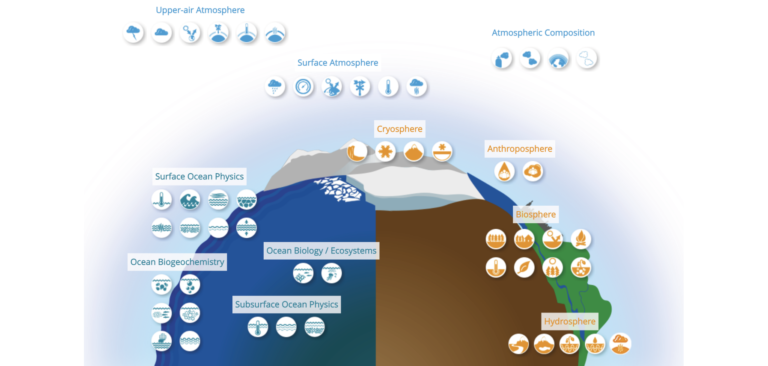The European Organization for the Exploitation of Meteorological Satellites (EUMETSAT) has highlighted four ways it will work with global partners to limit climate change and its effects.
Speaking at the Global Climate Observing System (GCOS) Climate Observation conference in Darmstadt, Germany, which took place October 17-19, Phil Evans, director general of EUMETSAT, said, “Current changes to the climate are posing a threat to the Earth. The steps we take today matter for our future and EUMETSAT aims to play a part in supporting a more sustainable way forward for the planet.”
The four key areas highlighted by EUMETSAT are maintaining records of essential climate variables; implementing the Paris Agreement; informing the United Nations about climate change; and providing continuous, long-term service, including the continuation of its Meteosat and Metop series with two missions, Meteosat Third Generation and EUMETSAT Polar System – Second Generation.
Conference participants also declared their commitment to a ‘comprehensive and sustainable global climate observing system’ to monitor the rapid development of climate change.
A declaration issued at the GCOS conference stated that climate observations have revealed unprecedented changes that are more widespread, rapid and intense than have been experienced for thousands of years. These changes affect all components of the climate system and every region on Earth. They cause more frequent and extreme events such as heat waves, storms, heavy rainfall and droughts that strongly affect human infrastructures and living beings.
Sabrina Speich, chair of the GCOS Climate Observation Conference, said, “Observations underpin all weather, climate, water and ecosystems services and products. Without the collection and sharing of these observations, the ability to understand, predict, mitigate and adapt to changes in the climate system is limited.”
Hosted by EUMETSAT, the conference focused on addressing urgent needs and gaps, and developing strategies and solutions for a sustainable future. It brought together 140 participants on-site and 400 online.
Climate observations have been instrumental in the development of scientific assessments and policies, including Intergovernmental Panel on Climate Change (IPCC) reports and the 2015 Paris Agreement. They are the cornerstone of efforts by organizations such as the WMO and IPCC to mitigate climate change, adapt to future conditions and reduce and address future loss and damage.
The newly released 2022 GCOS Implementation Plan specifies the climate observations required to inform science, services and society. The report was requested by the United Nations Framework Convention on Climate Change (UNFCCC). The GCOS Implementation Plan identifies existing gaps in Earth observations and areas in need of improvement that must be urgently addressed to progress toward a comprehensive and sustainable global climate observing system.
The conference called for a collective effort to sustain and improve the climate observing system, by defining a ‘global goal for observations’. In particular, the conference participants unanimously called for:
- Sustained, long-term funding, which is essential to ensure the continuity and expansion of observations needed to assess ‘essential climate variables’. The provision of many observations is still supported through limited-term funding, and the climate observing system remains fragile.
- The addressing of key gaps in networks for observing essential climate variables that have been identified in different components of the observing system, from the atmosphere to the ocean, from the cryosphere to the biosphere and the water inland. Priority areas for improvement are over parts of Africa, South America, Southeast Asia, the deep ocean and polar regions.
- The improvement of data quality, availability, accessibility and utility. Many climate observations are underexploited because of the lack of consistency in their processing, interoperability and usability. The conference provided concrete pathways to improvements, identifying that increased effort is required to ensure the data can be readily used in reanalysis and is fit for purpose.
- The creation and maintenance of climate data repositories. To address and understand climate change, the longest-possible time series need to be preserved and made available long term. Climate data must be made available through global data repositories, and their access must be free and open. The conference has identified the way to address this issue, including required actions and the need for increased funding to ensure data can be rescued from hard copy or archaic digital formats to extend existing data time series.
- The addressing of emerging needs. Climate information needs are changing. New needs have been identified, such as increased frequency of observations for adaptation and mitigation measures that need to be addressed in the short term. The global climate observing system must evolve in response to such needs.
- Engagement with nations. Many climate observations are made by national agencies, which need support and regional and global coordination. The benefits of climate observations need to be widely understood and the contributions of national observations to global data sets require enhancement.
- The improvement of regional to local climate change information to address the gap between the top-down, global production of observations and climate information and bottom-up local-scale decision making through better understanding of the local decision-making context and associated observational requirements.
- Enhancement of integrated and collocated observations of the physical, chemical and biological components of the climate system to better understand climate variability, trends and impacts, particularly on fragile ecosystems.
- Importance of reference quality observations in all domains.
- The conference participants called for the definition of an ‘action-oriented framework for observation’ under the UNFCCC, which should assist the coordination of efforts by international and national stakeholders and guide observation needs to report on the impacts of climate change and support climate mitigation and adaptation. Observations remain fundamental to the understanding of the current and future environment to support decisions on sustainable development.



